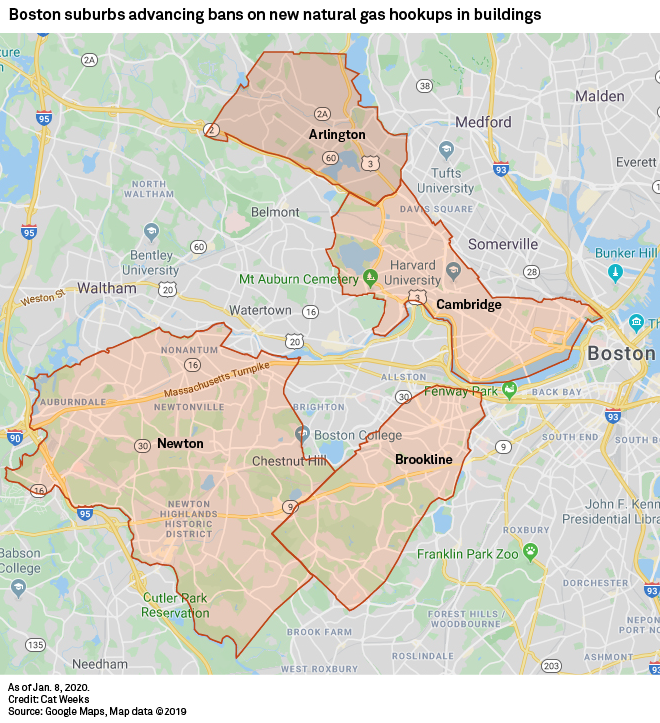Decarbonizing New England's natural gas grid will require a portfolio of solutions that likely includes green hydrogen and geothermal energy rather than systemwide electrification, according to Roger Kranenburg, vice president for energy strategy and policy at Eversource Energy.
Kranenburg sees electrification of heating playing some role in achieving Massachusetts' goal of reducing greenhouse gas emissions by 80% from 1990 levels by 2050. However, Kranenburg sees Eversource evolving into a "regional energy company" that delivers a range of low-carbon energy to end users, and the right solution might not always be electrification.
"We feel that if you push folks too much artificially towards electrifying heat, you will actually get a lot of backlash and it can undo what we all agree is the end objective, which is to decarbonize the economy," Kranenburg said during an Oct. 15 webinar hosted by the U.S. Association for Energy Economics' National Capital Area Chapter. "Instead of thinking of it as systemwide, let's look at what the customer characteristic and needs are. ... Let's look at it that way, and you'll come up with a portfolio solution to provide that service."
With the exception of California, the Boston area has emerged as the most active beachhead in the movement to adopt ordinances that require electric heating in new construction. Massachusetts Attorney General Maura Healey struck down the region's first gas ban in July, but lawmakers in several communities have resolved to pursue building electrification.

Limits of electrification
Electrification advocates have promoted air-source heat pumps as an alternative to gas boilers, arguing that technological advances mean they can perform well in cold weather climates. Kranenburg acknowledged that heat pumps do a very good job on average and could make sense particularly in rural areas. But the executive noted that to work well, they require a highly energy-efficient building envelope. New England has a lot of old buildings, and many are difficult to upgrade, Kranenburg said.
During extreme cold snaps, when the region often grapples with energy supply adequacy, some New England homes would have to rely on electric strip heating to augment air-source heat pumps, Kranenburg said. That would entail burning gas to produce electricity and losing roughly 50% of the commodity's energy and heat value, Kranenburg added. In some regions, geothermal energy looks attractive and would not be subject to the same challenges during extreme cold, the executive said.
New England is also a notoriously difficult place to site infrastructure, Kranenburg noted. Eversource did an internal study on electrifying heat throughout Cambridge, Mass., one of four communities advancing gas bans, and found it would need to build four or five substations in the city.
"The struggle we have is, we don't know where we're going to put the infrastructure. We're having a hard enough time building a substation today," Kranenburg said. "You just can't make the math work in our opinion. That's why the gas distribution, or molecules of some sort, has to be part of the future if we're going to meet this objective."
Keeping pipeline molecules in the mix
Kranenburg said the solution to decarbonizing the existing gas grid is possibly green hydrogen, produced by using renewable electricity to split water through electrolysis, and synthetic methane, which is processed from hydrogen and carbon dioxide, both of which can be blended into the existing distribution system at limited levels.
Kranenburg does not see much potential in the region for blue hydrogen, which is processed from natural gas and paired with technology to capture and sequester carbon emissions. New England does not have the geology to store carbon, so blue hydrogen would have to be shipped into the region and compete with locally produced green hydrogen, Kranenburg said. Eversource itself is developing substantial offshore wind capacity in New York and New England.
Policymakers should think carefully before retiring the gas distribution system, in light of the reliability it provides and its potential to efficiently transport renewable gas as part of a decarbonization solution, Kranenburg said.
As for Eversource's recent acquisition of Columbia Gas of Massachusetts, Kranenburg said he has fielded questions about how the deal squares with the company's environmental, social and governance push, which includes a goal of being carbon neutral by 2030. Kranenburg said there is an element of addressing equity by improving the existing system, which suffered a catastrophic series of fires and explosions in 2018.
"Parts of the region have significant immigrant communities," Kranenburg said. "What's important to think of is those folks should be offered the same health and safety as everyone else. Part of that is staying warm and running the system safely, making the necessary investments."



